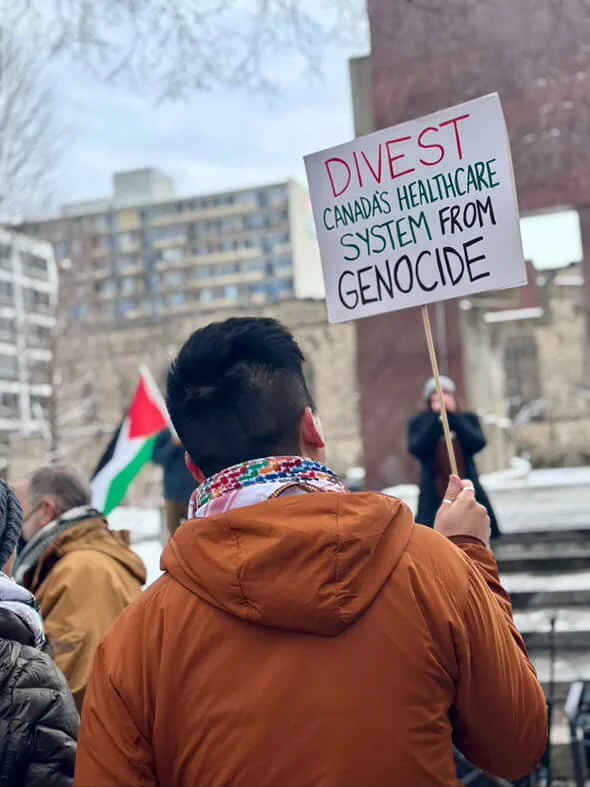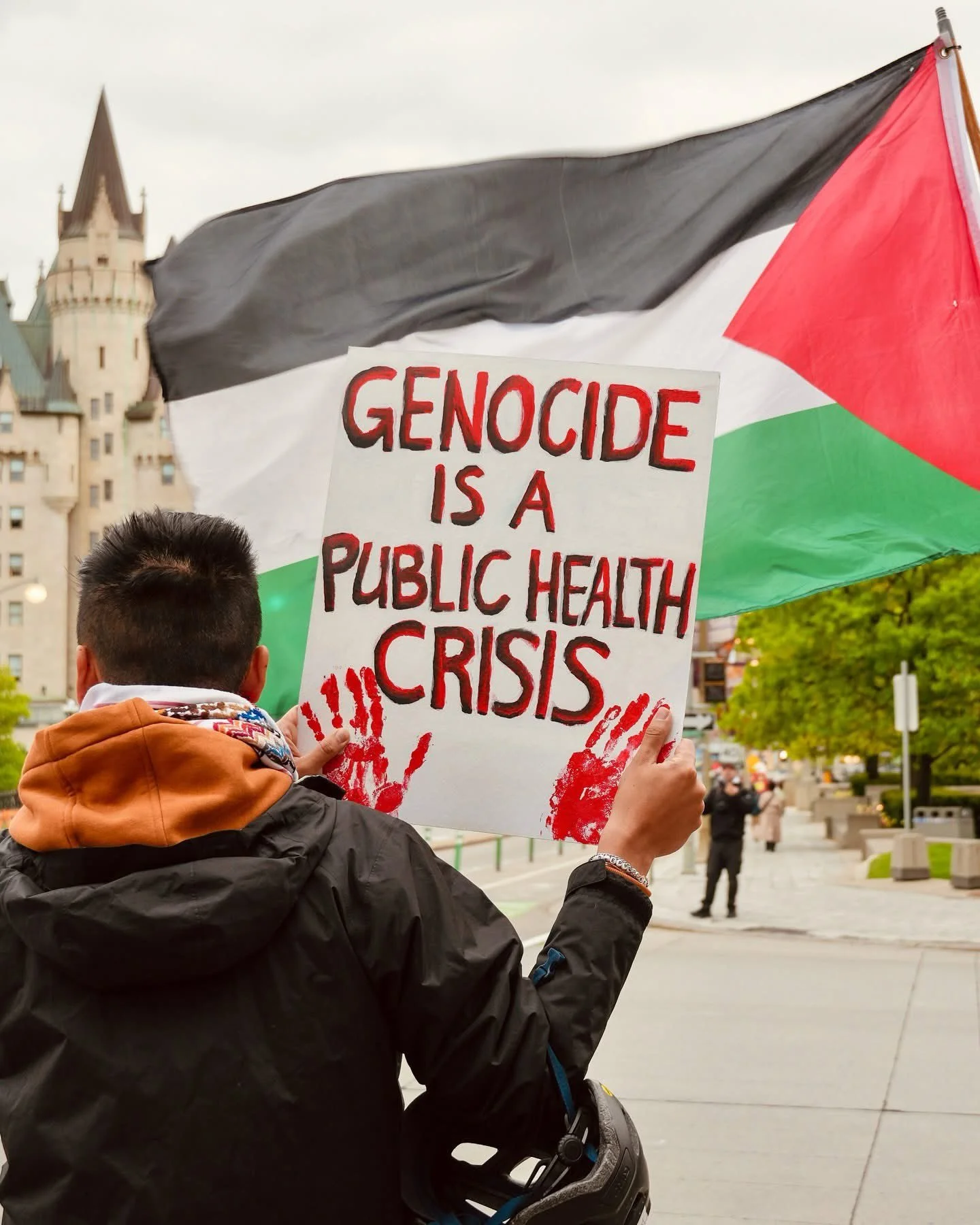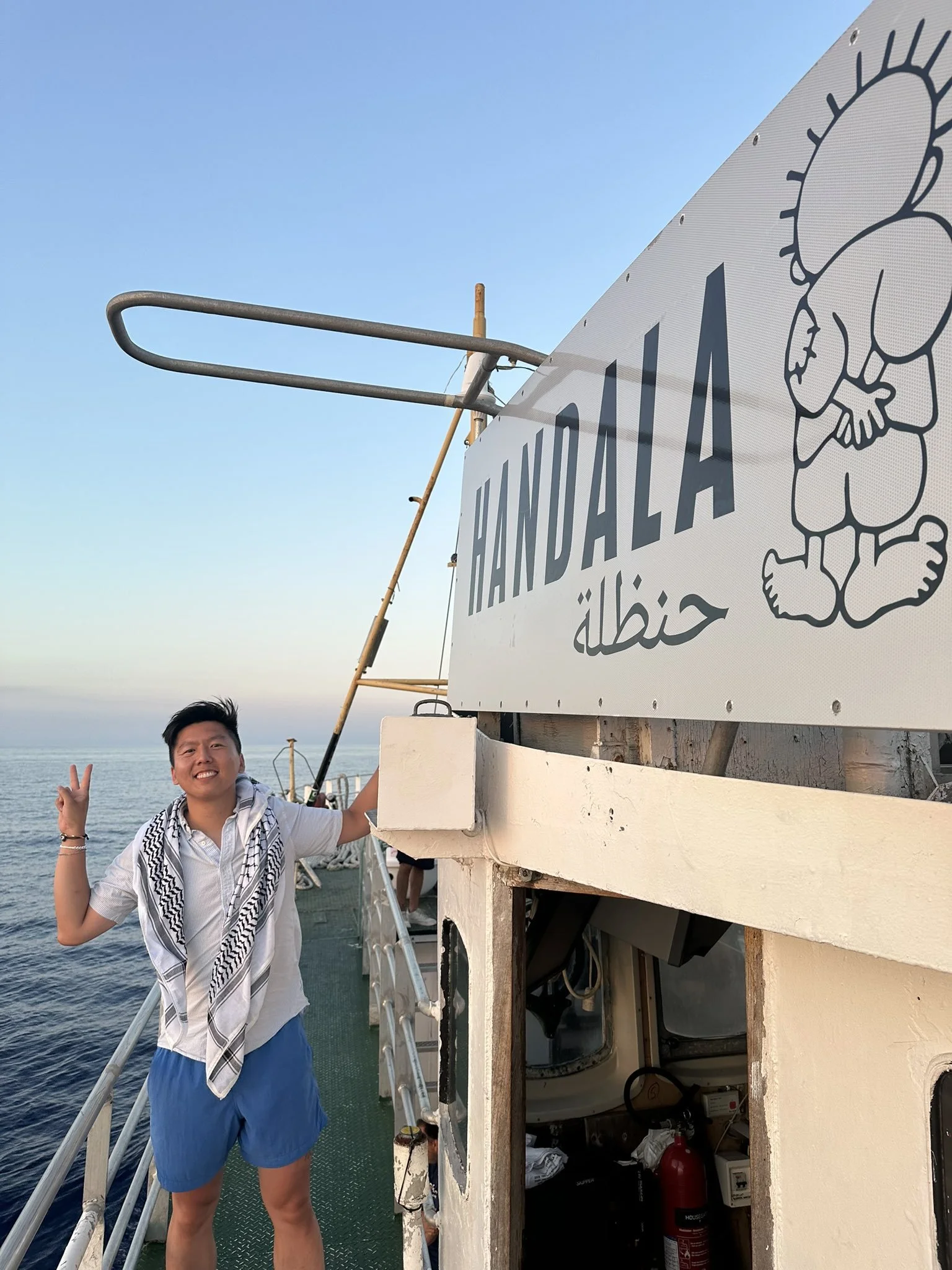“We All Have a Role to Play”: Dr. Yipeng Ge on Gaza, Genocide and Speaking Out
After being suspended for his pro-Palestinian posts, the Canadian physician refused to return to his residency. Instead, he went to Gaza to help, and hasn’t stopped fighting for justice since.
Photo supplied by Dr. Yipeng Ge.
When Dr. Yipeng Ge arrived in Gaza in February 2024, four months into a genocide, he was prepared for devastation. But nothing could have braced him for what he would experience in the clinics of Rafah: treating children without access to antibiotics, witnessing families deprived of clean water and food and ultimately learning that the clinic he worked in would later be destroyed and used temporarily as a morgue.
“To express solidarity with the Palestinian people as they experience genocide is the most decent thing to do as a doctor, especially as our own colleagues are being slaughtered en masse in Gaza with their families as we speak,” he says.
Ge, a public health physician and outspoken advocate for anti-racism and decolonization in medicine, has emerged as one of the most powerful medical voices in Canada speaking up for Gaza. But he’s paid a steep price for it.
Photo supplied by Dr. Yipeng Ge.
In early 2024, Ge was suspended from his residency program at the University of Ottawa after posting pro-Palestinian statements on social media. Though he was later cleared of any wrongdoing, the institution offered no apology—only what he describes as “weird bribes” to lure him back, including leadership courses and other incentives. Ge declined. He explains, “You want me to forget that you accused me of anti-Semitism? That you accused me of hate? They didn’t even acknowledge their own flawed process.”
The entire incident revealed just how deeply entrenched anti-Palestinian racism is, he says, not only in academic institutions but in the healthcare system. While he was on faculty, Ge even witnessed efforts to suspend or expel students for similar social media posts. He repeatedly pushed back in closed-door meetings, but—as is often the case—he was usually on his own.
“Not every space is worth giving time and energy,” he says now. “How do I stay within an institution that is so pervasive in their systemic anti-Palestinian racism? And this is also an institution who I’ve worked on anti-racism modules for, and the white, middle-aged physician who championed that work was silent in those meetings and couldn’t even make eye contact with me afterwards. I did what I could, now I’m going to put my energy elsewhere.”
When colleagues thanked him for intervening for those students who faced expulsion for their pro-Palestinian sentiments, he responded, “Don’t thank me. You need to speak up. You are a staff physician, you hold leadership positions. Why am I the one that has to speak up?” So, Ge shifted his focus to his grassroots organizing, aid work and awareness-building in Gaza. “Everything else is a distraction.”
Ge attempted to return to Gaza in May 2024, but was blocked when the Israeli military destroyed and occupied the Palestinian side of the Rafah crossing. Even so, he continued to coordinate with networks of doctors attempting to provide aid, many of whom face arbitrary entry denials and confiscation of essential supplies, like baby formula.
In June, he was also one of 4,000 people from around the world who joined the Global March to Gaza, a solidarity initiative aimed at peacefully walking from Al‑Arish in Egypt to the Rafah border crossing into Gaza. Supported by an international coalition of over 300 organizations and activists from over 50 countries, the march sought to demand humanitarian access—including a secure corridor for food, medicine and fuel—and place a spotlight on the ongoing humanitarian crisis and call for an end. Unfortunately, the march was cancelled after more than 200 activists were detained and nearly 500 deported by Egyptian authorities, though it certainly managed to win considerable global attention.
Born in China, raised in Waterloo, Ontario and trained in both Western and traditional forms of medicine, Ge’s work is rooted in understanding structural violence, whether in settler-colonial Canada or occupied Palestine. He explains, “I’ve always tried to think: how do we get closer to the world we want to envision?”
Photo supplied by Dr. Yipeng Ge.
His early education at McMaster University exposed him to Haudenosaunee knowledge and spurred what he calls a process of learning and unlearning what it means to be a Canadian citizen. “Canada Day was yesterday,” he noted during our interview. “And July 1 is also the day the Chinese Exclusion Act came into effect in 1923. Understanding the ways racialized people have been excluded or erased—Black, brown, Indigenous—has pushed me to ask how we can actually change these systems and structures. How do we centre people’s health and well-being? [These questions] led me into a lot of work in medicine and public health, from the framing of anti-racism and decolonization.”
That lens has been essential to his advocacy for Palestine. “Once you have a deep and political analysis of the root causes of disease and suffering, there’s no turning back.”
Still, the emotional toll of witnessing genocide firsthand lingers. “There are days that blend into each other. But the things that I did and the people I met in Gaza are seared into my memory,” he says, adding that he stays in touch with colleagues and patients he met there, mostly to just make sure they’re still alive. “Their needs aren’t being met. They can’t even get food for their children,” he adds.
Photo supplied by Dr. Yipeng Ge.
Days after we chatted, Ge joined the Gaza Freedom Flotilla, a civilian maritime mission to take over humanitarian aid. Their ship, called Handala, departed from Syracuse, Italy on July 13 and travelled to Gallipoli before heading to Gaza. Ge personally did not complete the journey, as the crew prioritized certain folks to help out in Gaza. Handala set sail after another ship, called Madleen, was illegally seized by Israeli forces in June, with all members forcibly detained and deported from Israel.
Photo supplied by Dr. Yipeng Ge.
Even amid all this devastation, Ge is clear-eyed about what the moment demands: not just solidarity, but action. He’s a strong supporter of the Boycott, Divestment, and Sanctions (BDS) movement, and calls for collective organizing. “Speaking up is not an end in and of itself,” he says. “There are very real, material things people can do to help the people of Palestine with their struggle for liberation and dignity. We all have a role to play in order to collectively build a movement that is strong and sustainable so that we ultimately can see a liberated Palestine in our lifetimes.”





